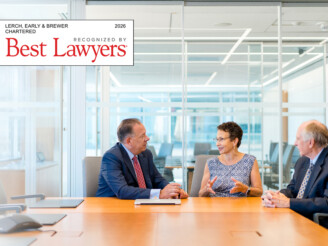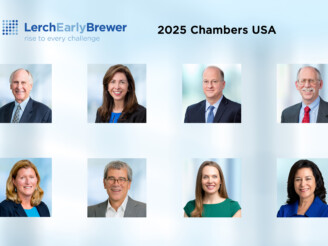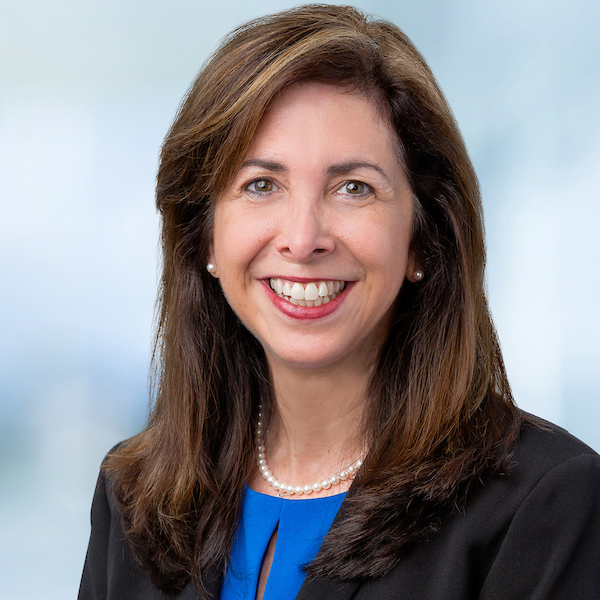Overview
Lauri Cleary is a trial lawyer who helps businesses, employers, and individuals navigate difficult issues and resolve disputes in and out of the courtroom throughout Maryland, DC, and Virginia. Lauri negotiates and litigates employment, commercial, real estate, professional responsibility and white-collar criminal defense cases in the trial and appellate courts.
Clients interviewed by leading legal directory Chambers USA call her “a great litigator who isn’t afraid to fight—she can be charming or forceful depending on what the situation calls for,” and noting that her “ability to see the entire battlefield has been a tremendous asset. She sees how pieces on the board will be moving.” Lauri’s three decades of commercial litigation and white collar criminal defense experience allow her to envision multiple paths to achieving her clients’ goals. Her common sense and intellectual curiosity drive her desire to understand and advocate for her clients’ interests.
She helps businesses and their owners assert and defend claims related to contracts, real estate and eminent domain, corporate and joint venture issues, non-competes, and other commercial matters. She also advises and defends management in all manner of employment matters, including litigation, such as discrimination and wage-hour claims. Religious organizations rely on Lauri to handle a wide range of matters related to their religious and educational operations, real estate holdings, and tax-exempt status, including cases involving First Amendment religious freedoms. Lauri represents individuals who are witnesses, subjects, or targets of white-collar criminal investigations and defends prosecutions in state and federal courts. Lauri also represents lawyers and others facing professional responsibility complaints.
As one client said, Lauri is “100% committed to [my] best interests.” She listens intently, probing so she really gets to know each person and problem. In difficult times, her clients appreciate Lauri’s gentle wit and the feeling that she will take care of them.
A past president of Maryland’s largest local bar association, the 2,500-member Bar Association of Montgomery County, and past president of the Montgomery County Bar Foundation, Lauri is well-known to lawyers and judges across the state. She has successfully litigated trial and appellate cases before state and federal courts and administrative agencies throughout Maryland, the District of Columbia, and Virginia. She is a founding member of the Cole-Davidson Appellate Inn of Court, and a permanent member of the Judicial Conference of the Fourth Circuit, a sustaining Fellow of the Maryland Bar Foundation, and serves on the Alumni Board of the University of Maryland’s Francis King Carey School of Law.
Lauri is a lifelong resident of Montgomery County who tries to make time to become a more proficient pianist, horseback rider, and golfer. She is a parishioner at Our Lady of Mercy in Potomac.
Education
- University of Maryland School of Law (J.D., 1985)
- University of Maryland (B.A. in English, 1982)
Admissions
- Maryland
- District of Columbia
- Virginia
- U.S. District Court, District of Maryland
- U.S. District Court, District of Columbia
- U.S. District Court, Eastern District of Virginia
- U.S. District Court, Western District of Virginia
- U.S. Court of Appeals, 4th Circuit
- U.S. Court of Appeals, District of Columbia Circuit
- U.S. Bankruptcy Court, District of Maryland
- U.S. Supreme Court
Clerkships
- Judicial law clerk to the Honorable Howard S. Chasanow, then a member of the Circuit Court for Prince George’s County, Maryland, and later to serve as one of the most distinguished members of Maryland’s Court of Appeals, the highest appellate court in the state.
Honors and Awards
- Named Chambers USA “Leader in the Field” of Litigation: General Commercial (2010-present)
- Named in The Daily Record Business & Employment Law Power List (2022)
- Named to Top Attorney List by Bethesda Magazine (2019, 2021)
- Listed in Best Lawyers in America: Appellate Practice, Bet-the-Company Litigation, Commercial Litigation, Criminal Defense: White-Collar, Employment Law – Management, Litigation – Insurance, and Litigation – Labor and Employment, (2018-present)
- Listed in Super Lawyers Maryland, Employment Litigation: Defense (2014-present)
- Listed in Super Lawyers Business Edition (2014-present)
- Listed in Super Lawyers Washington, DC, Employment Litigation: Defense (2014-present)
- Litigation Counsel of America Fellow (2014-present)
- Named one of Daily Record’s 50 Most Influential Marylanders (2014)
- Received Daily Record’s Leadership in Law Award (2009)
- Received Montgomery County Bar Foundation Community Service Award for co-chairing Law School for the Public, a local cable public service television program (2009)
- Inducted “Bar Leader” by Montgomery County Bar Foundation (2007)
- Received John Carroll Society Pro Bono Service Award (2007)
- Ranked AV Preeminent by Martindale-Hubbell Peer Review Ratings (1998-present)
Community Involvement
- Interfaith Works (Board of Directors, 2015-2022)
- Montgomery County Coalition for Adult English Literacy (“MCAEL”) (Board of Directors, 2022-present)
Professional Memberships
- University of Maryland Francis King Carey School of Law Alumni Board (President, 2025; Member, 2018-present)
- Judicial Conference of the Fourth Circuit (Permanent Member, 2018-present)
- Bar Association of Montgomery County, Maryland (Past President, 2017-2018; President, 2016-2017; President-Elect, 2015-2016; Executive Committee, 2010-2012; Chair, Law School for the Public, 2007-present)
- Montgomery County Bar Foundation (President, 2017-2018; Board of Directors, 2012-present; Endowment Committee, 2012-present; former Chair, Pro Bono Committee)
- Montgomery County Pro Bono Committee (Member, 2018-present)
- Maryland State Bar Association (Board of Governors, 2019)
- Maryland Bar Foundation (Fellow, 2018)
- District of Columbia Bar Association
- Virginia State Bar Association
- Federal Bar Association, Maryland Chapter
- Catholic Charities Legal Network (former Archdiocesan Legal Network of the Archdiocese of Washington) (Advisory Council, Executive Committee, 2004-2014)
- American Bar Foundation (Life Fellow, 2011-present)
- Litigation Counsel of America (Senior Fellow)
- Women’s White Collar Defense Association, Washington D.C. Chapter (Member)
Practice Areas

Employment/Labor
Lerch Early helps employers throughout the Washington, DC metropolitan area and beyond prevent and defend against workplace claims. Working with our attorneys is like extending the human resources department without hiring additional people.

Litigation
Lerch Early’s litigation team helps businesses, including nonprofits, and individuals resolve disputes throughout the Washington, DC metropolitan area.

Education
Lerch Early helps educational organizations throughout Maryland, DC, and Virginia provide great places to learn and work. We serve preschools, K-12 private schools, and public and private colleges and universities.
News & insights

Lerch Early Attorneys Named to 2026 Maryland Super Lawyers List
Multiple Lerch Early attorneys have been selected for inclusion in the 2026 Maryland Super Lawyers and “Rising Stars” lists. Super Lawyers is a listing of outstanding lawyers from more than …

Protecting Trade Secrets & Other Confidential Information
Employment and litigation attorneys Lauri Cleary and Jase Tilley presented on protecting trade secrets and confidential information, highlighting what makes a trade secret protectable, the steps you can take to safeguard all confidential …

Lerch Early Attorneys Named to 2026 Best Lawyers in America
Multiple lawyers from several Lerch, Early & Brewer practices recently were selected by their peers for inclusion in The Best Lawyers in America® 2026. Fourteen Lerch Early attorneys have been named to the Ones to Watch …

Chambers USA 2025 Ranks Lerch Early in Real Estate and Litigation
Chambers USA 2025: America’s Leading Lawyers for Business has recognized Lerch Early in the areas of Litigation: General Commercial and Real Estate. Litigation: General Commercial (Band 3)Chambers describes the team as “the best …

Lerch Early Attorneys Named to 2025 Maryland Super Lawyers List
Multiple Lerch Early attorneys have been selected for inclusion in the 2025 Maryland Super Lawyers and “Rising Stars” lists. Super Lawyers is a listing of outstanding lawyers from more than …

Hot Topics in Employment Law
Employment and litigation attorneys Jessie Summers, Lauri Cleary, and Jase Tilley covered a host of predetermined topics and attendee questions as part of a panel discussion as part of Lerch, …
Representative Matters
- Whistleblower Employment Defense: Successfully defended a major healthcare nonprofit in an eight-day jury trial in which a nurse alleged wrongful termination in violation of Maryland’s Healthcare Whistleblower statute. The jury returned a verdict in favor of our client.
- White Collar Criminal Defense: Served as defense trial co-counsel in 2013 three-month jury trial of a defendant indicted in one of the most significant health care fraud prosecutions in the United States.
- Fortune 100 Employment Defense: Represents Fortune 100 company employing more than 500 local workers to defend claims of disability and other forms of discrimination before the EEOC and Maryland Commission on Human Rights.
- Religious Property Tax Exemption: Successfully defended in the Maryland Court of Appeals (Maryland’s highest court) the Church of Jesus Christ of Latter-day Saints retention of its religious exemption on a Montgomery County apartment complex that houses religious workers serving the Washington Temple. The Court of Appeals deemed the case to be of such legal significance that it took the case from the intermediate appellate court, then upheld the trial judge’s ruling that the property qualified for exemption as a “convent.”
- Premises Liability Involving Stormwater Management: Defended a local Seventh-day Adventist church, its parent denomination, and its construction manager in a multimillion-dollar flooding claim. Won a jury trial in the Circuit Court of Montgomery County and successfully defended that verdict in the Court of Special Appeals, (clarifying Maryland’s law of nuisance. Successfully argued all but one issue (the trial judge’s dismissal of one of our opponent’s claims at trial) in the Court of Appeals, and subsequently resolved the remaining claim on favorable terms.
- Non-Compete Litigation: Successfully prosecuted and defended breaches of non-compete agreements in Maryland, DC, and Virginia federal and state courts.
- Title Claims: Litigated title disputes in federal and circuit courts for major national insurer. Helped define rights between rival title insurers where common agent commits defalcation.
- Grand Jury Investigation: Successfully represented employee witness in major corruption case involving elected official in Prince George’s County.
- Terminations and Separation Agreements: Guided Maryland university through reductions in force and other terminations to meet strategic goals and respond to economic conditions; also guided executives and other managerial employees through the negotiation of executive separation agreements and new employment agreements.
Disclaimer: Each case is different and past results do not guarantee similar results in future matters.


